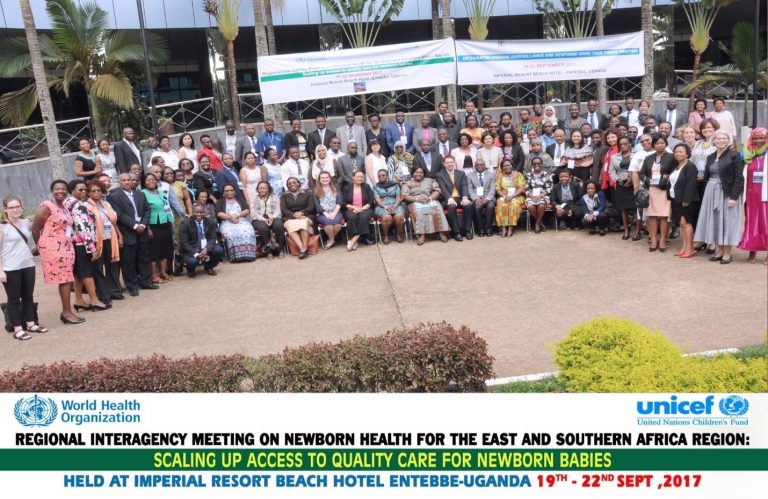Despite promising progress, the Eastern and Southern Africa Region is home to some of the countries with the highest national newborn mortality rates in the world, with Angola having 59 and Somalia 39 neonatal deaths per 1000 live births. Overall, the region has a maternal mortality ratio of 417 per 100,000 live births and a neonatal mortality rate of 25 per 1000 live births.
UNICEF, WHO, USAID and partners co-convened a regional meeting on newborn health in Entebbe, Uganda from 19 to 22 September 2017. The Ugandan Minister of Health, Hon. Dr. Jane Ruth Aceng, graced the inaugural session and renewed the country’s commitment to meet SDG targets to end preventable maternal, newborn and child deaths and reduce still births. Representatives from UNICEF, WHO and USAID also spoke at the occasion and confirmed their continued support to newborn survival efforts.
The four day meeting brought together 103 participants made up of delegates from twenty countries including from fragile countries of South Sudan and Somalia. The technical sessions spanned topics of situation of maternal and neonatal health in the region: updated WHO guidelines, quality of care, clinical mentoring, birth registration, advocacy and community engagement, sick new born care, surveillance of birth defects, perinatal death reviews and newborn care in emergency settings. Of particular interest was a panel discussion on Kangaroo Mother Care, country poster session and a market place of innovations introducing the new technologies and approaches such as the hypothermia detection wrist band for pre-terms and training devices which included MamaBirthie among others.
Country group work sessions allowed participants to identify particular challenges and opportunities for prioritizing national action for newborn survival. A major output of the meeting were the draft operational plans.
Speaking at the occasion the UNICEF Regional Advisor for Health, Gabriele Fontana remarked,
“To achieve the desired impact, we have to focus on improving both coverage and quality of the evidence based maternal and newborn health care interventions. There is no programmatic short cut to maternal and newborn health. We have to do all that it takes from realistic planning, adequate financing, health system strengthening, improving quality of care around the time of birth and involving parents and communities in this mission. At the same time, it is important to prioritize actions that are more likely to bring the highest impact and that are feasible in each national context.”
Key feedback from the participants included appreciation of this opportunity for learning and exchange of ideas; the need to package the different interventions and trainings to allow better and swifter implementation; equal focus on high burden, high NMR, and also small countries; investing in pre-service trainings to save costs of repeated in-service trainings, mentorship programmes for in-service capacity building and continued technical assistance from partners to generate and sustain momentum.
Blog by Fatima Gohar, UNICEF ESARO; Nabila Zaka, UNICEF; Assumpta Muriithi, WHO
Download:
